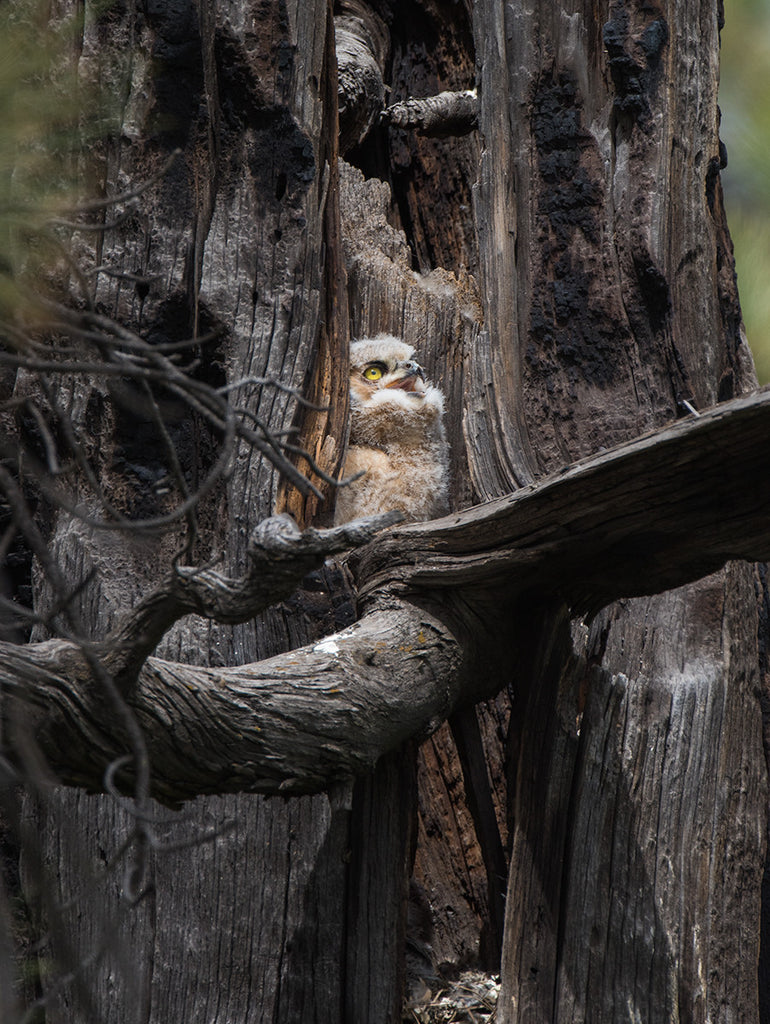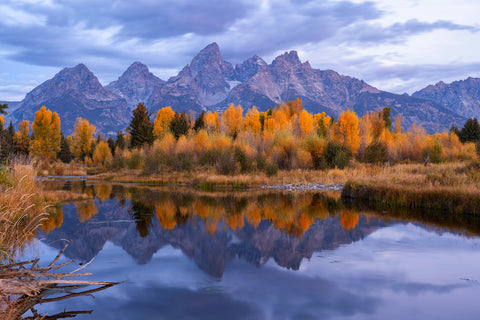On my 35th birthday, I worked an 18-hour day. A decade later, on my 45th, I finalized plans to walk away from a good salary, premium healthcare benefits, and a great retirement plan. Turning my back on all things sensible, I decided to pursue something closer to my soul - to dive headlong back into the world of the arts, beginning what I fervently hope will be a life-long journey. A trip not only to some of the wilder places on this planet, but an odyssey to validate my belief that the best a person can do with their life is follow a dream.
I was thinking about it all on a sunny day in Montana when the only thing that belied the coming of spring was an instinctual appreciation of more light than there had been a month earlier. The great horned owl I was photographing, sitting on her nest inside a massive Douglas fir snag, was sheltered from the biting north wind. Even the feathers on her head - those long, raised "ears" - didn't bend in the air that was hitting me square in the face, sailing down from a land where her relatives were all white and blended with a tundra landscape still covered in ice and snow.
I shivered and looked around, half thinking I could smell black spruce, half believing this north gale had rolled back time a full two months. As my brain came to terms with the brown, winter-packed grass around me and I realized fully where I was, I blinked hard and looked through my viewfinder again, into the yellow eye of a bird I've loved since I was six years old and saw one with my father on a Vermont trout stream. In the moments before night that evening, its silhouette sat dark against a silver horizon, its ears clearly visible as it watched us fish out our last cast. At the click of my dad's Orvis reel, its head swiveled 180 degrees, and like a miniature storm cloud giving way to a clearing wind it silently slid out of sight.
This Montana owl would do the same thing, I thought, if its instinct to guard its eggs was any less powerful. Bound by its ancient need to bring new generations of her species into the world, instead of flying away, it fixed me with an unblinking stare thousands of years old. I wasn't going to stay long, wasn't going to get any closer, and wanted her to understand I meant no harm. I said so, quietly under my breath, and wondered if she understood. No, I decided, she did not. After all, what do owls know?
*
My father used to say, half in jest, that if God had concluded his little experiment in evolution with the great apes it would have been a glowing success. Sometimes he'd wonder how far a silverback would be able to hit a baseball if so inclined. Or wish the brook trout in the Black River below our house in Irasburg had never been subjected to over-fishing and acid rain. Once, he told me he'd gladly sacrifice all civilization, including his own life, to drop from the history books the swing of one Mr. Bucky Dent on an October day in 1978 when the Yankees eliminated his beloved Red Sox during a one-game playoff for the American League Championship. I'd laughed when he said it, just as I did the other day thinking about it again.
I was driving west on I-90, clipping by Bozeman, Montana, at close to 80mph, and I have no idea what made me think of that. Perhaps something in the early-summer evening light reminded me of similar days as a boy - the lights of the American Legion ballpark I passed flicking on just then, or the smell of fresh-cut grass, or clouds on the southern horizon where a nighttime storm might or might not form. Whatever triggered the thought, I was happy to have it. And then I looked north toward the base of the Bridger Mountains and my smile faded.
The great apes sure as hell wouldn't have done this, I thought. Subdivision homes glowed nearly as far as I could see, their large, west-facing windows lit by the last rays of this day. Beautiful houses in beautiful country, and no end to them in sight. Not ever, I don't believe.
It was a sobering thought, immediately bringing me back to a plane ride I took last fall from Atlanta up to Boston on a clear day. Air traffic control had jogged us east toward Washington, D.C., then back west over Cleveland, and finally sent us straight as an arrow up the Pennsylvania and New York coast to Beantown. I had a window seat, unobstructed by one of the great, aluminum wings I usually watch - somewhat nervously - flex and bounce through turbulence, and from 33,000 feet could see our sprawl in miniature.
Downtowns flowerd into not-quite-downtowns which in turn petered out into strip malls with signs I knew advertised foot massages, deeply-discounted furniture, Starbucks coffee, 24-hour fitness centers, and walk-in-clinics. Then came true suburbia - perfectly sectioned lots big enough for azure swimming pools, green tennis courts, football and baseball fields, and the occasional front-yard tree. Beyond these were larger homes with more trees where vehicles crawled insect-like, a worker's commute well over an hour to the "real" cities. Next, where geography forced ingenious methods of building into cliffs, over ravines, and virtually on top of serpentine rivers, the houses were larger still. Where these ended, and it was hard to define that point exactly, ragged strips of besieged farmland, open to attack on fronts both north and south, ribboned between the next set of mega-homes.
Christmas future, I thought as I passed Belgrade, Montana, and picked up my first view of the Tobacco Root Mountains, snow-capped and jagged. Behind me, in the south-central part of the state, two great horned owl chicks had hatched into a world where they knew only their parents' soft, belly feathers and the taste of fresh voles brought as food throughout the night. They had no idea that I was thinking in time we will squeeze the last of the wild out of Amercia. Wring it dry as a desert. Pound every last inch of it into environments conforming only to us and our insatiable desire for more. No, they didn't know this.


*
I found myself breathing a little easier by the time I hit Whitehall and could see the Continental Divide looming in the west, a long line of mountains not much different than they were 10,000 years ago. As I drove into their shadow and watched my truck's thermometer confirm that outside air here hadn't seen the sun in an hour and was ten degrees cooler, I thought about the Clovis-style spearpoint I found near here ten years ago. A creamy porcelanite, the man who'd last touched it before me had seen mammoths. And he'd dared believe he could kill them with a stick and stone.
Research suggests that at the height of the Native American population, probably not long before the Columbus expedition, there may have been a million people in North America. Here, in Montana, it was a harsh existence of plains living revolving around the bison. As I crested Homestake Pass and dropped down toward Butte, following rills which eventually lead to the Pacific, I wished I could have seen it - grizzlies in the prairie, miles-long herds of bison, elk living far from any timber.
Undeniably, a hell of a lot has changed in 500 years, much of it just since Lewis and Clark were here 200 years ago. I believe, that while I can't see ancient Montana, I am witnessing its fastest transformation. Anywhere that has a view of mountains - doesn't seem to matter much which ones - ranches are falling. Dirt's being broken for new houses which are sold before they're completed and every year their price is going up double-digit percents. It seems a race to devour every square inch of habitable land - where, unlike horseback pioneers during the Homestead Acts, we come by jet and motor home and fancy automobiles and pay, in some cases, north of a quarter-million an acre.
It boggles my mind. In Billings, where I live, there are dozens and dozens of existing homes for sale, while equally that many are being built new. That's us these days, I thought as I retraced my tracks back to Yellowstone County from Butte a few days later. We want the latest and greatest and by god, we want it NOW.
It's reflected in everything, including my photography equipment, I realized when I checked in on the owls. The notion of taking a canister of film to a store to be developed, even in a one-hour facility, seems ludicrous. Instead, push a button on the back of my Nikon and see the image right in the here and now. And, if it takes more than a few milliseconds to appear, start shopping for faster CF cards, the next latest, greatest camera, and heaven forbid I don't have cell service and can't shop for it right there on my phone.
I watched the owlets, peering out into the world, one a little braver than its sibling, taking their first tentative steps away from their nest. They didn't know that my camera could meter light, align the horizon, take a series of pictures exposed for an HDR combo, or decide, entirely on its own, which part of the photo to assign exposure priority to. They didn't know that if it couldn't do these things, even just one of them, I'd be on to the next product in a heartbeat - as fast as Amazon Prime could get it to me.

*
Time moves in one direction. I've said it before, but it seems faster now. The start and stop dates of our Montana seasons seem less defined, blurring together into a whir of months going by at, tipping my hat to my Vermont roots, "a furious clip." I suppose this factors into my decision to step away from the certain life. To venture - this time with better perspective than I had when I wrote novels from a three-room house in Butte - back toward something I can invest more of my heart in.
I truly believe I'm seeing Montana's fastest changes, and that factors into my decision, too. I want to get out there and record things the way they are now. They way I see them. Photograph them when there's still some wilderness - a few places I don't sleep quite as well at night because there are a handful of creatures left there that might eat me.
It's going to go away, I believe, and I'll go on the record as saying that now. It will disappear one driveway, one rafter, one mountain lake-view cabin at a time, lost to our unquenchable appetite for more. I don't believe we have, as a species, the capacity to reign ourselves in. Not in sufficient numbers to have significant effects.
As the great horned owlets transformed from fuzzy balls more beak than feathers into something caught between young and adult, they weren't thinking about any of this. They were eating more, having more difficulty fitting their wings - simultaneously anyway - into their hollow tree, and spending more time in the limbs of an adjacent fir. Their parents would swoop in when I approached, always at least one of them, land nearby, give me a reproachful stare, and then fly a hundred yards away, no longer bound by instinct to protect the helpless. Perhaps they'd seen me enough to form some favorable opinion, or, more likely, were leaving survival up to their young. Nature demands that, I guess.


*
The owlets fledged one weekend while I was away. Too soon it seemed to me, but that, too, is the way of Nature. It was about the time we officially dropped out of the Paris Climate Accord, leaving 194 other nations to fend for themselves. On the final morning I walked to the nest tree and found the owlets gone, I came across one of the adults, the male, I believe. Smaller than his mate, he was sitting low to the ground and looked tired. I took a few hand-held shots of him then watched him flap into a tree fifty feet away, tuck in close to the trunk, and close his eyes.
"You did well to tolerate my intrusions," I said softly, hoping that somewhere, not far off, his offspring slept after perhaps their first successful hunts.
"Well done," I said. And then I walked away, headlong into a world I don't have a hell of a lot of hope for, one in which my legacy may be little more than photos. Some will be of owls, though they have no idea.





Marjorie Kramer
I forgot to say how good your essay is and how beautiful and focused and thorough.
Marjorie Kramer
I don’t think we have the discipline to reign ourselves in either. It seems possible to me some sort of scourge will decimate our numbers. Or more moderately, we will create a world with a high population, driveways and development everywhere and no really wild places maybe Japan approaches that, don’t really know but I do love cities. Or war, and its destruction of us and nature could be our future. We do seem capable of living harmoniously together and not breeding like crazy but as you know, other human species have gone extinct, Clovis, a giant asteroid might be our future. . I cannot comprehend what wonderful and what horrid things we are capable of.
Brenda Machado
Thank you!! Beautiful truth there’s a lump in my throat.
Annie
Beautiful and all too real. This is perfect.
Shirley Young Perry
Hi Jake,
It is good to hear from you this way. I could have missed it this evening as I was about shut off the lights in dining room go into the bedroom and crawl into bed. Something told me to open my cell and check for anything new. When I saw your photos and began to read, I just had to keep reading. Please continue; there must be more.